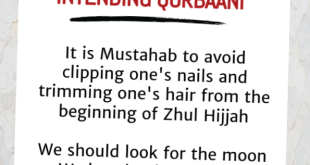 1. When entering the town or city, one should one should recite the following Duaa thrice:
1. When entering the town or city, one should one should recite the following Duaa thrice:
اللهم بارك لنا فيها
O Allah, grant us barakah in this place
Thereafter, one should recite the following Duaa:
اَللَّهُمَّ ارْزُقنَا جَنَاهَا وَحَبِّبنَا إِلَى أَهلِهَا وَحَبِّبْ صَالِحِى اَهلِهَا إِلَينَا
O Allah, give us of its fruit and produce and make us beloved to its people and make the pious of its people beloved to us.
عن ابن عمر رضي الله عنهما قال كنا نسافر مع رسول الله صلى الله عليه و سلم فإذا رأى القرية يريد ان يدخلها قال اللهم بارك لنا فيها ثلاث مرات اللهم ارزقنا جناها وحببنا إلى أهلها وحبب صالحى اهلها إلينا (المعجم الأوسط للطبراني رقم 4755)
Hadhrat ibn Umar (Radhiallahu Anhuma) reports: “We (the Sahaabah (radhiyallahu ‘anhum)) would travel with Rasulullah (sallallahu ‘alaihi wasallam). When Rasulullah (Sallallahu Alaihi Wasallam) saw a town which he intended entering, he would recite the above-mentioned duaa.
- One should also recite the following Duaa:
اَعُوذُ بِكَلِمَاتِ اللهِ التَّامَّاتِ مِن شَرِّ مَا خَلَق
I seek protection through the perfect and beneficial words of Allah Ta’ala (i.e. His names and attributes) from the evil (harm) of His creation.
عن خولة بنت حكيم السلمية أنها سمعت رسول الله صلى الله عليه وسلم يقول إذا نزل أحدكم منزلا فليقل أعوذ بكلمات الله التامات من شر ما خلق فإنه لا يضره شيء حتى يرتحل منه (مسلم رقم 2708)
Hadhrat Khaula (Radhiallahu Anha) reports that she had heard Rasulullah (Sallallahu Alaihi Wasallam) say: “If anyone of you halts at any place, and he recites the following duaa, then no harm will come to him from the time he halts till the time he departs.
اَعُوذُ بِكَلِمَاتِ اللهِ التَّامَّاتِ مِن شَرِّ مَا خَلَقَ
2. When one fears an attack (by an enemy) or fears for one safety, one should recite Surah Quraish. [1]
[1] قال القاضي ثناء الله: عن ابي الحسن القزويني موقوفا ان خاف من عدو او غيره فقراءة لايلاف قريش امان عن كل سوء ذكره الجزري في الحصن الحصين و قال مجرب. قلت و قد امرني شيخي و امامي قدس الله سره السامي بقراءته في المخاوف لدفع كل سوء و بلاء و قال مجرب. قلت و قد جربته كثيرا. (التفسير المظهري 10/348)
 Wifāq ul Ulāma (SA) ASSOCIATION OF SOUTH AFRICAN 'ULAMA
Wifāq ul Ulāma (SA) ASSOCIATION OF SOUTH AFRICAN 'ULAMA
